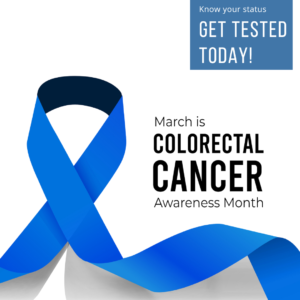Dear Community and Friends
March marks a significant period in our calendar – National Colorectal Cancer Awareness Month. It’s a time dedicated to educating and providing resources to our community on the importance of early detection. As we navigate through this crucial month, let’s unite in spreading knowledge and taking action against one of the most treatable and often preventable diseases.
Colorectal cancer is the third most common cancer diagnosed in both men and women in the United States. Shockingly, over 50,000 individuals in the U.S. lose their lives to colorectal cancer annually. According to the American Cancer Society, about 1 in 23 men and 1 in 25 women will develop colorectal cancer in their lifetime. Understanding the scope of this disease is the first step toward prevention and early detection. These statistics highlight the urgent need for proactive measures to combat this disease.
Risk Factors:
It’s crucial to understand the risk factors associated with colorectal cancer to prevent it. Some common risk factors include:
- Age: The risk increases with age, particularly for individuals over 50.
- Family History: Having a close relative with a history of colorectal cancer increases the likelihood.
- Genetic Conditions: Certain inherited conditions, such as Lynch syndrome or familial adenomatous polyposis (FAP), elevate the risk.
- Unhealthy Diet: A high intake of red and processed meats is linked to an increased risk of developing colorectal cancer.
- Lack of Physical Activity: Sedentary lifestyles increase susceptibility to colorectal cancer.
- Smoking: Tobacco use has been linked to an elevated risk of developing colorectal cancer.
- Inflammatory Bowel Diseases: Conditions like Crohn’s disease or ulcerative colitis can increase the risk over time.

Book a free Consultation
Get help from an experienced Business Consultant. Schedule yourconsultation at a time that works for you and it's absolutely FREE.
Empowering Actions for Prevention:
We should take proactive steps to protect our health & the well-being of our loved ones –
Early Screening:
If you’re 45 or older or have a family history of colorectal cancer, early screening is key. Regular screenings can detect abnormalities before they become advanced, significantly improving the chances of successful treatment.
Healthy Choices:
Increase your intake of vegetables, fruits, and whole grains. These foods contain essential nutrients and antioxidants that are beneficial for your overall health, including your colorectal health.
Stay Active:
Studies have shown that engaging in regular physical activity can effectively reduce the risk of developing colorectal cancer. Aim for at least 150 minutes of moderate-intensity exercise per week to keep your body in optimal condition.
Reduce Risks:
Limit alcohol consumption and avoid tobacco use. Both these lifestyle choices have been linked to an increased risk of colorectal cancer. By making conscious decisions, you can significantly lower your susceptibility.
Your Health Journey Matters:
For those at the recommended screening age or with identified risk factors, taking proactive steps is crucial:
Consult Your Physician:
Early detection can make all the difference. Book regular check-ups with your healthcare provider and discuss your family history and any concerns you may have. Your doctor can advise you on the most appropriate screening schedule.
Utilize Community Resources:
Reach out to organizations such as the American Cancer Society (1-800-227-2345) and the National Cancer Institute (1-800-4-CANCER) for valuable support and information. These resources offer a wealth of information, from understanding your risk factors to navigating the various screening options available.
As we embrace the importance of National Colorectal Cancer Awareness Month, let’s remember that our health is our number one priority. Love yourself, and take care of yourself because you are indeed worth every bit of the effort. This mantra is not just a reminder but a call to action for each of us to take our health seriously and to support those around us in doing the same. By spreading awareness, encouraging preventive measures, and providing support, we can collectively make a significant impact in the fight against colorectal cancer. Let this month be a catalyst for positive change and commit to a healthier future.
Read Another Blog: The Heart of the Matter: Love and Health Intertwined




